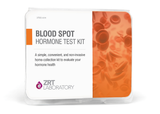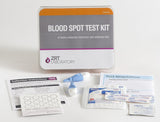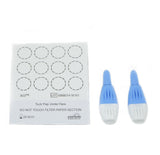- Thyroid Stimulating Hormone (TSH),
- Free Triiodothyronine (fT3),
- Free Thyroxine (fT4) and
- Thyroid Peroxidase Antibody (TPOab).
- Also, see Elite Thyroid Test
- Contains Blood Spot collection kit
- The test samples can be collected at the comfort of your home
- Free delivery in the UK
- Customers are responsible for shipping their samples to the laboratory.
- The test kit includes a laboratory fee: no additional laboratory cost and tax.
- Test Result: You will receive your test result via email within 3-5 working days after the laboratory receives your sample. You will see your hormone levels in graphics and numbers on your test result. You will also see laboratory comments by Hormone Specialist PhD Dr. on your test result, which suggests a healthy diet, what kind of exercise you should do and some reading materials on maintaining your hormone level balanced. After receiving your test result, we strongly recommend you to show your test result to your GP and see if you need any treatment or further action needs to be taken.
- The test must be used within 12 months after the purchase date.
- Test Requisition Form includes Symptom Checklist
- Requisition Form to complete, including your personal and medical history
- Contains collection instructions
- Instructions on How to Use blood spot Collection Kit
- Shipping Instruction
- Return Envelope
Advantages of a Simple Blood Spot Test
- No phlebotomist or centrifugation is required; therefore less expensive and more convenient than conventional blood draws.
- A nearly painless finger stick is used to collect the few drops of blood required.
- Private and convenient for both patient and healthcare provider - collection at home or provider’s office
- Hormones and other analyses are stable in dried blood spots at room temperature for weeks, allowing for worldwide shipment.
- Safe handling and transport of samples, as infectious agents are destroyed by drying.
Who Should Test?
Essential Thyroid Profile Individuals require thyroid screening. Routine screening is recommended for:
- Children who have Down’s Syndrome
- Individuals over the age of 50
- Anyone with a family history of thyroid disorders
- People experiencing symptoms of thyroid dysfunction
- People with autoimmune disorders, especially those with a history of autoimmune thyroiditis
Symptoms of thyroid problems include:
- Weight gain or inability to lose weight even with exercise and diet
- Weight loss
- Feeling cold all the time when others don’t
- Low energy and stamina (mainly in the evening)
- Irregular bowel habits – constipation/loose stools
- Dry, thinning, and itchy skin
- Hair loss, Dry/brittle hair and nails
- Depression, Insomnia
- Water retention
- Menstrual irregularities
- Low sex drive, infertility
- Memory lapses or slow/fuzzy thinking
- Osteoporosis
- Muscle and joint aches and pains
- High blood pressure, Increased cholesterol levels
- Heat or cold intolerance
Thyroid Hormone Imbalance
Thyroid disease or dysfunction can explain various symptoms (see list below), yet it is notoriously under-diagnosed. For example, the Colorado Thyroid Disease Prevalence Study published in 20001 found that 9.9% of the study population consisted of people who were not being treated for thyroid problems yet had abnormal thyroid function test results. This suggests that their thyroid disease was previously undiagnosed. This study also found a significantly greater incidence of thyroid dysfunction in women than in men in each decade after age of 34. The American Thyroid Association estimates that over 12% of the US population will develop thyroid disease during their lifetime and that as many as 60% of people with thyroid disease are not aware of it2. Overt hypothyroidism, with its characteristically high TSH and low circulating T4 levels, and hyperthyroidism, with low TSH and high T4 levels, are easy to recognise clinically. But an elevated TSH associated with normal thyroid hormone (T3 and T4) levels, defined as “subclinical” hypothyroidism, is thought to be present in 4-10% of the general population and in up to 20% of women over 60 years old; and a low TSH with normal T3 and T4 levels, subclinical hyperthyroidism, occurs in about 2% of the population and is most common in women, blacks, and the elderly3.
Tests in Dried Blood Spot
TSH – Thyroid Stimulating Hormone
It is produced by the Pituitary. TSH acts on the thyroid gland to stimulate the thyroid hormone T4 and T3 production. Higher than normal TSH can indicate overproduction of or excessive supplementation with T4 and T3, Which acts in negative feedback on the Pituitary to reduce TSH production. Low TSH can also be caused by problems in the pituitary gland itself, which result in insufficient TSH being produced to stimulate the thyroid (secondary hypothyroidism).
Free T4- Thyroxine
The thyroid gland produces the predominant hormone. It is an inactive hormone converted to its active form, T3, within cells. Free T4 is the non-protein bound fraction of the T4 circulating in the blood, representing about 0.04% of the total circulating T4 available to tissues. Low TSH combined with low T4 levels indicates hyperthyroidism. High TSH and low T4 abdicate a thyroid gland disease, such as autoimmune thyroiditis (Hashimoto’s).
Free T3 – Triiodothyronine
The active thyroid hormone regulates the metabolic activity of cells. Free T3 is the non-protein-bound fraction circulating in the blood, representing about 0.4% of the total circulating T3 available to tissues. Therefore, elevated T3 levels are seen in hyperthyroid patients. Still, levels can be expected in hypothyroid patients because it does not represent the intracellular conversion of T4 to T3, which comprises about 60% of all T3 formed in tissues.
TPO – Thyroid Peroxidase Antibodies
Thyroid peroxidase is an enzyme used by the thyroid gland in the manufacture of thyroid hormones by liberating iodine for attachment to tyrosine residues on thyroglobulin. In patients with autoimmune thyroiditis (predominantly Hashimoto’s disease), the body produces antibodies that attack the thyroid gland, and levels of these antibodies in the blood can diagnose this condition and indicate the extent of the disease.
Elements that Affect Thyroid Function
We are all, to varying degrees, depending on our dietary choices, our supplementation routine, or our lifestyle, exposed to the elements iodine, bromine, selenium, arsenic, and mercury. Levels of these elements in the food we eat are determined by soil levels and other environmental exposure of plants and animals that end up in the food chain and ultimately on our dining tables. We can also be directly exposed to elements through environmental pollution of the air we breathe and exposure through our skin. How does exposure to these elements affect health? Iodine is an essential component of T3 and T4, so its deficiency seriously impacts thyroid hormone synthesis, while bromine is in the same chemical family as iodine, and excessive amounts will compete with iodine in the thyroid. Selenium is a component of the selenoproteins, including the iodothyronine deiodinases, which convert inactive T4 to its active form in the body (T3), and glutathione peroxidase, which prevents free radical damage to the thyroid by destroying the hydrogen peroxide that is a by-product of thyroid hormone synthesis. Arsenic and mercury are toxic heavy metals that form tight complexes with selenium and therefore reduce selenium’s bioavailability, resulting in biological effects similar to selenium deficiency, including disruption to thyroid health. While bromine, arsenic, and mercury are known biological toxins, even iodine and selenium can potentially be toxic if dietary intake, including excessive supplementation, is too high.
Clinical Aspects of Thyroid Dysfunction
Thyroid hormones are primarily involved in directing the metabolic activity of cells, and a properly regulated thyroid is therefore essential to a wide array of biochemical processes in the body. Functional hypo- and hyperthyroidism can also result in symptoms even when hormone levels appear to be normal. Thyroid function can be affected by interactions between thyroid hormones and other hormone systems, particularly estrogens and cortisol, by some nutritional deficiencies, particularly iodine and selenium, and environmental exposure to bromine and arsenic selenium, and mercury. Management of thyroid dysfunction requires understanding these interactions and careful monitoring of treatment with thyroid hormone testing. The presence of thyroid peroxidase (TPO) antibodies has been found to help diagnose thyroid disease in patients with abnormal TSH and/or thyroid symptoms with normal thyroid hormone levels and is used to indicate the presence of autoimmune thyroiditis. Hashimoto’s disease is the most common cause of overt hypothyroidism and 95% of patients are positive for TPO antibodies. Thyroid dysfunction, including thyroid autoimmunity, is also strongly linked with infertility.
How to Use











